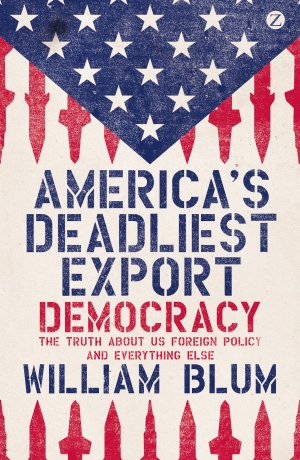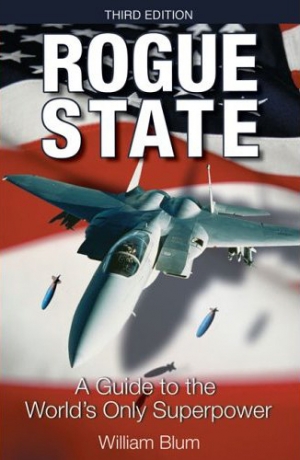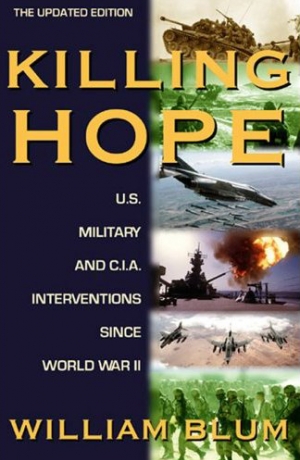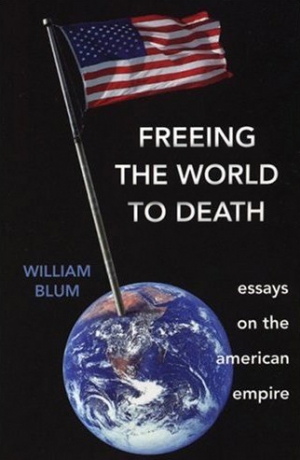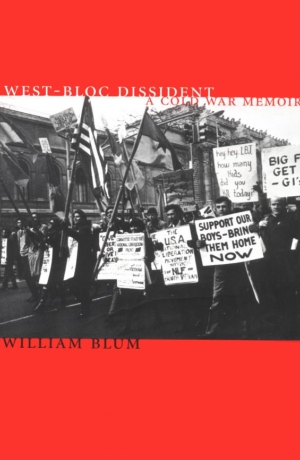The Anti-Empire Report #54
By William Blum – Published February 2nd, 2008
NATO is a treaty on wheels – It can be rolled in any direction to suit Washington’s current policy
Have you by chance noticed that NATO, the North Atlantic Treaty Organization, has become virtually a country? With more international rights and military power than almost any other country in the world? Yes, the same NATO that we were told was created in 1949 to defend against a Soviet attack in Western Europe, and thus should have gone out of existence in 1991 when the Soviet Union and its Warsaw Pact expired and explicitly invited NATO to do the same. Other reasons have been suggested for NATO’s creation: to help suppress the left in Italy and France if either country’s Communist Party came to power through an election, and/or to advance American hegemony by preventing the major European nations from pursuing independent foreign policies. This latter notion has been around a long time. In 2004, the US ambassador to NATO, Nicholas Burns, stated: “Europeans need to resist creating a united Europe in competition or as a counterweight to the United States.” 1
The alliance has been kept amongst the living to serve as a very useful handmaiden of US foreign policy as well as providing American arms and airplane manufacturers with many billions of dollars of guaranteed sales due to the requirement that all NATO members meet a certain minimum warfare capability.
Here’s some of what NATO has been up to in recent years as it strives to find a new raison d’être in the post-Cold War era.
It is presently waging war in Afghanistan on behalf of the United States and its illegal 2001 bombing and invasion of that pathetic land. NATO’s forces free up US troops and assume much of the responsibility and blame, instead of Washington, for the many bombings which have caused serious civilian casualties and ruination. NATO also conducts raids into Pakistan, the legality of which is as non-existent as what they do in Afghanistan.
The alliance, which began with 15 members, now has 26, in addition to 23 “partner countries” (under the reassuring name of (“Partnership for Peace”). Combined, that’s more than one-fourth of the entire United Nations membership, and there are numerous other countries bribed and pressured to work with NATO, such as Jordan which recently sent troops to Afghanistan. Jordan and Qatar have offered to host a NATO-supported regional Security Cooperation Centre. NATO has a training mission in Iraq, and Iraqi military personnel receive training in NATO members’ countries. In recent years, almost all members of the alliance and the Partnership for Peace have sent troops to Iraq or Afghanistan or the former Yugoslavia, in each case serving as proxy US-occupation forces. Israel has had talks with the alliance about the deployment of a NATO force in their country. India is scheduled to participate in upcoming NATO war games. The list goes on, as the alliance’s outreach keeps reaching out further, holding international conferences to bring together new and potential allies, under names such as the Istanbul Cooperation Initiative, and the Mediterranean Dialogue (Algeria, Egypt, Israel, Jordan, Mauritania, Morocco and Tunisia), or expanding military ties with existing international organizations such as the Gulf Cooperation Council (Bahrain, Kuwait, Oman, Qatar, Saudi Arabia, the United Arab Emirates).
After the September 11, 2001 attacks, NATO gave the United States carte blanche to travel throughout Europe transporting men to be tortured. 2 It’s like a refined gentleman’s club with some unusual member privileges. NATO also goes around monitoring elections, the latest being in Upper Abkhazia (claimed by Georgia) in January.
The alliance has military bases in Germany, Italy, Spain, Portugal, Netherlands, and elsewhere in Europe, and regularly conducts “naval operations in the Mediterranean to actively demonstrate NATO’s resolve and solidarity”, as NATO puts it. This includes AWAC (Airborne Warning and Control) aircraft patrolling the Mediterranean from above and frequently stopping and boarding ships and boats at sea. “Since the start of the operation,” reports NATO, “nearly 79,000 merchant vessels have been monitored (as of 12 April 2006) … The surveillance operation utilizes ship, aircraft and submarine assets to build a picture of maritime activity in the Area of Operations.” The exercise includes “actions aimed at preventing or countering terrorism coming from or conducted at sea and all illegality possibly connected with terrorism, such as human trafficking and smuggling of arms and radioactive substances.” NATO is truly Lord of the Mediterranean, unelected, unauthorized, and unsupervised.
NATO, which has ready access to nuclear weapons from several of its members (only with Washington’s approval), has joined the United States in its operation to surround Russia. “Look,” said Russian president Vladimir Putin about NATO as far back as 2001, “this is a military organization. It’s moving towards our border. Why?” 3 As of December 2007, Moscow’s concern had not lessened. The Russian Deputy Foreign Minister lashed out at NATO’s steady expansion into former Soviet-dominated eastern Europe, saying the policy was “a leftover from the time of the Cold War”. 4 Finland – which shares a border with Russia of more than 1300 km – is now being considered for membership in NATO.
Ever since it undertook a Washington-instigated 78-day bombing of the former Yugoslavia in 1999, NATO has been operating in the Balkans like a colonial Governor-General. Along with the UN, it’s been leading a peacekeeping operation in Kosovo and takes part in the policing of Bosnia, including searching people’s homes looking for suspected war criminals wanted by the International Criminal Tribunal for the Former Yugoslavia. The triumvirate of NATO, the United States, and the European Union have been supporting Kosovo’s plan to unilaterally declare independence from Serbia, thus bypassing the UN Security Council where Serbia’s ally, Russia, has a veto. We therefore have the Western powers unilaterally declaring the independence of a part of another country’s territory; this because the Kosovo ethnic Albanians are regarded as much more reliably “pro-West” than is Serbia, which has refused to look upon the free market and the privatization of the world known as “globalization” as the summum bonum, nor shown proper enthusiasm for an American or NATO military installation upon its soil. Kosovo, however, does have a large US military base on its territory. Any attempt by Serbia to militarily prevent Kosovo from seceding would in all likelihood be met by NATO/US military force. You may wonder what a United States military base is doing in Kosovo. People all over the world wonder the same about their local American bases.
You may also wonder: What force exists to slow down the growth of the Mediterranean Monster? Who can stand up to it? The military elite of the triumvirate take such a question seriously. What they apparently fear the most is nuclear weapons in the hands of the wrong people; i.e., those who don’t recognize the triumvirate’s right to dictate to the world. On January 22 the Guardian of London reported that the former armed forces chiefs from the US, Britain, Germany, France and the Netherlands had released a manifesto which insists that a “first strike” nuclear option remains an “indispensable instrument” since there is “simply no realistic prospect of a nuclear-free world”. The paper had earlier been presented to NATO’s secretary general and to the Pentagon. It is likely to be discussed at a NATO summit in Bucharest in April, along with the possible extension of the alliance to include five more countries which had been part of, or bordered on, the Soviet Empire: Croatia, Georgia, Macedonia, Albania and Ukraine.
The five generals who authored the report could have advocated a serious international campaign to begin the process of actually creating a nuclear-free world. Instead, they call for an end to the European Union’s “obstruction” of and rivalry with NATO and a shift from consensus decision-taking in NATO bodies to majority voting, meaning an end to national vetoes.
So there you have it. The international military elite are demanding yet more power and autonomy for NATO. Questioning voices in the alliance, in the European Union, or anywhere else should forget their concerns about a nuclear-free world, international law, pre-emptive war, wars of aggression, national sovereignty, and all that other United Nations Charter and human-rights nonsense. We’re gonna nuke all those Arab terrorists before they have a chance to say Allah Akbar.
The arrogance continues, with the manifesto specifying “no role in decision-taking on Nato operations for alliance members who are not taking part in the operations,” calling also for the use of force without UN Security Council authorization when “immediate action is needed to protect large numbers of human beings”. Now who can argue against protecting large numbers of human beings?
The paper also declares that “Nato’s credibility is at stake in Afghanistan” and “Nato is at a juncture and runs the risk of failure.” The German general went so far as to declare that his own country, by insisting upon a non-combat role for its forces in Afghanistan, was contributing to “the dissolution of Nato”. Such immoderate language may be a reflection of the dark cloud which has hovered over the alliance since the end of the Cold War – that NATO has no legitimate reason for existence and that failure in Afghanistan would make this thought more present in the world’s mind. If NATO hadn’t begun to intervene outside of Europe it would have highlighted its uselessness and lack of mission. “Out of area or out of business” it was said. 5
Democracy is a beautiful thing, except that part about letting just any old jerk vote.
“The people can have anything they want. The trouble is, they do not want anything. At least they vote that way on election day.” 6
Why was the primary vote for former presidential candidate Dennis Kucinich so small when anti-Iraq war sentiment in the United States is supposedly so high, and Kucinich was easily the leading anti-war candidate in the Democratic race, indeed the only genuine one after former Senator Mike Gravel withdrew? Even allowing for his being cut out of several debates, Kucinich’s showing was remarkably poor. In Michigan, on January 15, it was only Kucinich and Clinton running. Clinton got 56% of the vote, the “uncommitted” vote (for candidates who had withdrawn but whose names were still on the ballot) was 39%, and Kucinich received but 4%. And Clinton, remember, has been the leading pro-war hawk of all the Democratic candidates.
I think much of the answer lies in the fact that the majority of the American people – like the majority of people all over the world – aren’t very sophisticated politically, and many of them aren’t against the war for very cerebral reasons. Their opposition perhaps stems mainly from the large number of American soldiers who’ve lost their lives, or because the United States is not “winning”, or because America’s reputation in the world is being soiled, or because a majority of other Americans express their opposition to the war, or because of George W.’s multiple character defects, or because of a number of other reasons you couldn’t even guess at. Not much especially perceptive or learned in this collection.
I think there are all kinds of intelligence in this world: musical, scientific, mathematical, artistic, academic, literary, mechanical, and so on. Then there’s political intelligence, which I would define as the ability to see through the bullshit which the leaders and politicians of every society, past, present and future, feed their citizens from birth on to win elections and assure continuance of the prevailing ideology.
This is why it’s so important for all of us to continue “preaching to the choir” and “preaching to the converted”. That’s what speakers and writers and other activists are often scoffed at for doing – saying the same old thing to the same old people, just spinning their wheels. But long experience as speaker, writer and activist in the area of foreign policy tells me it just ain’t so. From the questions and comments I regularly get from my audiences, via email and in person, and from other people’s audiences as well, I can plainly see that there are numerous significant information gaps and misconceptions in the choir’s thinking, often leaving them unable to see through the newest government lie or propaganda trick; they’re unknowing or forgetful of what happened in the past that illuminates the present; knowing the facts but unable to apply them at the appropriate moment; vulnerable to being led astray by the next person who offers a specious argument that opposes what they currently believe, or think they believe. The choir needs to be frequently reminded and enlightened.
As cynical as others may think they are, the choir is frequently not cynical enough about the power elite’s motivations. They underestimate the government’s capacity for deceit, clinging to the belief that their government somehow means well; they’re moreover insufficiently skilled at reading between the media’s lines. And this all applies to how they view political candidates as well. Try asking “anti-war” supporters of Hillary Clinton if they know what a hawk she is, that – as but one example – she’s promised that American forces will not leave Iraq while she’s president. (And Obama loves the empire as much as Clinton.) When Ronald Reagan was president, on several occasions polls revealed that many, if not most, people who supported him were actually opposed to many of his specific policies.
In sum, even when the hearts of the chorus may be in the right place, their heads still need working on, on a recurring basis. And in any event, very few people are actually born into the choir; they achieve choir membership only after being preached to, multiple times.
When I speak in public, and when I can mention it in an interview, I raise the question of the motivations of the administration. As long as people believe that our so-called leaders are well-intentioned, the leaders can, and do, get away with murder. Literally.
“How to get people to vote against their interests and to really think against their interests is very clever. It’s the cleverest ruling class that I have ever come across in history. It’s been 200 years at it. It’s superb.” 7
Another interesting view of the American electoral system comes from Cuban leader Raúl Castro. He recently noted that the United States pits two identical parties against one another, and joked that a choice between a Republican and Democrat is like choosing between himself and his brother Fidel.
“We could say in Cuba we have two parties: one led by Fidel and one led by Raúl, what would be the difference?” he asked. “That’s the same thing that happens in the United States … both are the same. Fidel is a little taller than me, he has a beard and I don’t.” 8
Speaking of political intelligence … take a little stroll with Alice through the American wonderland … just for laughs
“This war [in Iraq] is the most important liberal, revolutionary U.S. democracy-building project since the Marshall Plan. … it is one of the noblest things this country has ever attempted abroad.” – Thomas Friedman, much-acclaimed New York Times foreign-affairs analyst, November 2003 9
“President Bush has placed human rights at the center of his foreign policy agenda in unprecedented ways.” – Michael Gerson, columnist for the Washington Post, 2007 10
The war in Iraq “is one of the noblest endeavors the United States, or any great power, has ever undertaken.” – David Brooks, New York Times columnist and National Public Radio (NPR) commentator (2007) 11
If this is what leading American public intellectuals believe and impart to their audiences, is it any wonder that the media can short circuit people’s critical faculties altogether? It should as well be noted that these three journalists are all with “liberal” media.
And when Hillary Clinton says in the January 31 debate with Barack Obama: “We bombed them [Iraq] for days in 1998 because Saddam Hussein threw out inspectors,” and the fact is that the UN withdrew its weapons inspectors because the Clinton administration had made it clear that it was about to start bombing Iraq …
Obama didn’t correct her. Neither did any of the eminent journalists on the panel, though this particular piece of disinformation has been repeated again and again in the media, and has been corrected again and again by those on the left. Comrades, we have our work cut out for us. The chorus needs us. America needs us. Keep preaching.
Teaching political intelligence
If you’re a high school or college teacher, you might want to look at http://www.teachpeace.com/highschoolkit.htm for teaching aids to impart a progressive outlook on US foreign policy and related issues to your students.
Notes
- Jewish Telegraph Agency, international wire service, February 16, 2004
- The Guardian (London), June 7, 2007, article by Stephen Grey, author of “Ghost Plane: The inside story of the CIA Torture Program” (2006)
- Associated Press, June 16, 2001
- Focus News Agency (Bulgaria)/Agence France-Presse, December 26, 2007
- Much of the NATO material can be found on NATO’s website: http://www.nato.int. Also see an abundance of material at: http://groups.yahoo.com/group/stopnato/messages
- Eugene Debs, American socialist leader, early 20th century
- Gore Vidal
- Associated Press, CNN.com, December 25, 2007
- New York Times, November 30, 2003
- Washington Post, September 7, 2007
- Mary Eberstadt, ed., “Why I turned Right: Leading Baby Boom Conservatives Chronicle Their Political Journeys” (2007), p.73
Any part of this report may be disseminated without permission, provided attribution to William Blum as author and a link to williamblum.org is provided.
